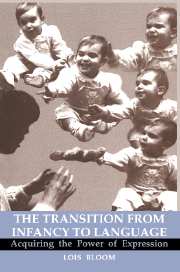Book contents
- Frontmatter
- Contents
- Preface
- Acknowledgments
- PART I THEORY AND BACKGROUND
- PART II FROM 9 MONTHS TO 2 YEARS
- 6 Translation from Theory to Method
- 7 Developments in Expression
- 8 Developments in Affect Expression
- 9 Developments in Word Learning
- 10 Developments in Cognition
- 11 Meaning and Expression
- Appendix: Dictionary of Words in the Playroom
- Notes
- References
- Name Index
- Subject Index
7 - Developments in Expression
Published online by Cambridge University Press: 04 August 2010
- Frontmatter
- Contents
- Preface
- Acknowledgments
- PART I THEORY AND BACKGROUND
- PART II FROM 9 MONTHS TO 2 YEARS
- 6 Translation from Theory to Method
- 7 Developments in Expression
- 8 Developments in Affect Expression
- 9 Developments in Word Learning
- 10 Developments in Cognition
- 11 Meaning and Expression
- Appendix: Dictionary of Words in the Playroom
- Notes
- References
- Name Index
- Subject Index
Summary
This chapter begins by showing how we defined the two expressive behaviors we observed, affect and words, with the coding categories for affect expression and the criteria for achievements in word learning we used. The frequencies of words and emotional expressions at the beginning and end of the period are the first result reported here to show that emotional expression does not decrease as words are acquired. Following this is a description of certain aspects of the mental meanings attributed to the intentional states underlying the children's emotional expression and words.
AFFECT AND WORDS IN THE SINGLE-WORD PERIOD
Affect Expression
Expressions of affect carry both categorical and gradient information. Categorical information is the discrete emotion that is expressed, such as anger, fear, joy, or sadness. Gradient properties include qualitative descriptive features of an expression, such as its intensity and valence. Intensity is the relative fullness of a display and can vary from a barely perceptible frown to a raging cry, or from the slightest of smiles to hysterical laughter. Valence is the hedonic tone or value of an expression, such as a positive tone in joy and pleasure and a negative tone in sadness, anger, and fear. Neutral affect is the presence of hedonic tone without either positive or negative valence. Neutral affect is not a lack of affect, because affect is always present. And it is not to be confused with the so-called flat affect sometimes seen in certain instances of pathology.
- Type
- Chapter
- Information
- The Transition from Infancy to LanguageAcquiring the Power of Expression, pp. 140 - 156Publisher: Cambridge University PressPrint publication year: 1993

